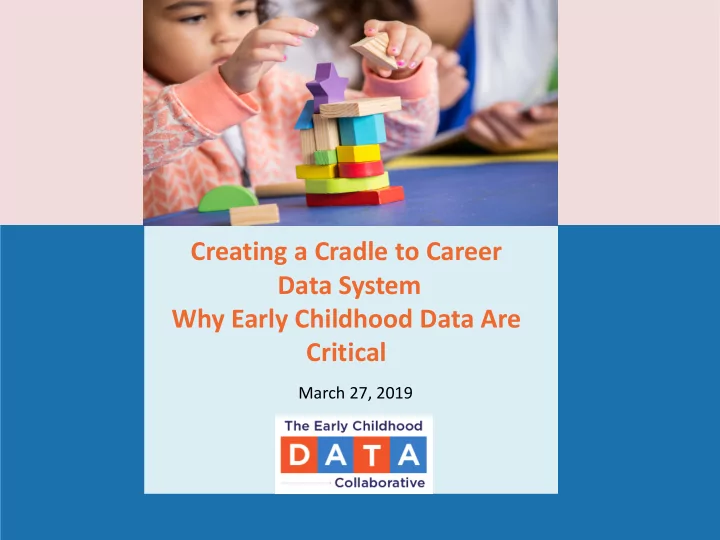

Creating a Cradle to Career Data System Why Early Childhood Data Are Critical March 27, 2019
Early Childhood Data Collaborative www.ecedata.org Mission The Early Childhood Data Collaborative (ECDC) promotes policies and practices to support the development and use of coordinated, longitudinal state early care and education (ECE) data systems. Guiding Principles • From compliance-driven to improvement-driven data systems • From fragmented data systems to coordinated data systems • From “snapshot” data to longitudinal data systems 2
Early Childhood Data Collaborative www.ecedata.org In partnership with: • The Center for the Study of Child Care Employment at UC Berkeley • Council of Chief State School Officers • Data Quality Campaign • National Conference of State Legislatures • National Governor’s Association, Center for Best Practices 3
Why Are Early Childhood Data Critical? • Birth-8 is a critical time period for children in achieving positive health, learning, and economic outcomes later in life. • The need for data during this period is growing to understand the impacts of early childhood interventions and services. • Data about young children, including longitudinal data, typically cannot be connected together.
Integrating Data to Support Children’s Learning 5
Uses of Integrated Early Childhood Data To support cross-agency goals: • target services to children with the greatest needs • conduct meaningful research to inform and improve ECE services • narrow racial and economic achievement gaps 6
Efforts to Integrate Education Data • Statewide Longitudinal Data Systems (SLDS) Grant Program 1 – 51 states were awarded $721 million in grants – California received two grants • Race to the Top- Early Learning Challenge 2 – 20 states were awarded $1 billion in grants – 10 states prioritized data systems development 1 2019 SLDS Best Practices Conference 2 Rising to the Challenge: Building Effective Systems for Young Children and Families, a BUILD E-Book-Chapter 7: Stacking the Blocks: A Look at Integrated Data Strategies 7
8
A single source in NC for integrated early childhood data for selected education, health and social services programs Example of questions that can now be answered with NC-ECIDS: 1. How many children are receiving multiple services? What are the demographics of children who are receiving 3, 4, or 5 services? Is there geographic variation where children are receiving larger or fewer numbers of services? 2. How many children who are pre-K age eligible are not in NC Pre-K are receiving other types of services (e.g., subsidized child care, TANF, food and nutrition services)? 9
Current Participating Number of Children Receiving Programs: Multiple Services • NC Pre-K • Subsidized child care (N=339,413) • Early Intervention - IDEA, 100.0% Part C 72.8% • Special Education - IDEA 80.0% Part B (619) 60.0% • Food & Nutrition Services 27.2% • Child Protective Services 40.0% 20.0% Planned for the future: 0.0% • Head Start/EHS • Temporary Assistance for Children receiving one service Needy Families Children receiving two or more services • EC Workforce data • Child Care Regulatory Data 10 Source: North Carolina Early Childhood Integrated Data System (2014-15). Number of children receiving multiple NC ECIDS Services.
• Public standard aggregate reports • Report customizer • Data request process 11
7 Key Areas to Focus on For Implementation 1. *Stakeholder Engagement 2. Data Governance 3. Privacy, Security, and Transparency 4. Linking, Matching, and Sharing 5. Data Access and Use 6. Data Quality 7. State Capacity 12
Stakeholder Engagement • Process to systematically and meaningfully involve those directly or indirectly affected from the outset – Input on policy questions the data system will answer – Develop transparent privacy protection and security practices and policies – Communicate how data will and will not be used – Feedback on uses and dissemination of data (e.g. reports, research, etc.) 13
Intended Users and Uses • All Users (general public, participating state agencies, policymakers, researchers – Standard Reports – Query/Customizable Reports • Internal and External Researchers – Dedicated data request portal for individual research requests – Research stakeholder group 14
Carlise King, Executive Director Early Childhood Data Collaborative Phone: 240-223-9329 Email: cking@childtrends.org Visit www.ecedata.org for more information Follow us on twitter @ecedata 15
Recommend
More recommend